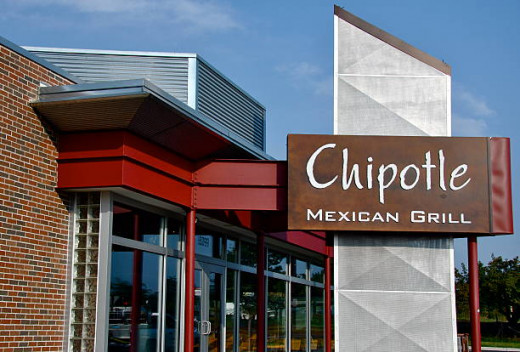An Evaluation of Chipotle Mexican Grill and the Effectiveness of Its “food With Integrity” Strategy

An Overview of Chipotle Mexican Grill
The Chipotle Mexican Grill, Inc. is a multinational chain of restaurants that operate within United Kingdom, United States, France, German and Canada. The restaurant chain specializes in such foods as tacos, burritos, chili pepper and dried jalapeño. Other food items include the fajita burritos, salads and burrito bowls. The company’s newer mission statement is Food with Integrity, which it uses to highlight its new efforts of employing organic ingredients in the food menu. This is also the only restaurant which claim to serve the type of meat that is naturally raised (those raised with no antibiotics or hormone injections). It is also among the food chain of fast casual dining establishments. Chipotle has also expanded in Europe, where it opened the first restaurant in 2010 in London and Paris in 2012. The company’s top management team consists of the Executive officers, Chief Development Officer, Chief Financial Officer, and the Chief Marketing Officer (Wayne, 2011).
Despite previous setbacks, the company’s outstanding success has been attributed to its new philosophy of “Food with Integrity”. Food with Integrity principle means that the entity adheres to use of only fresh and quality ingredients. The company’s values ensure that they focus on the best cooking techniques and the best ingredients to make the food available to all types of people at a fair price. This concept has facilitated the company’s growth in popularity, and in returns. This growth is also attributed to increased demand from customers who are after fresh and less expensive food. Chipotle is keen on knowing the source of all its ingredients and supplies in an endeavor to promote sustainably grown and natural food products as well as local farmers that align with their mission of food with integrity (Chipotle, 2014).
Problems with Chipotle’s Food Integrity and Credibility
From the time of its inception, Chipotle had come under criticisms that were directed at some of sourcing policies and lack of transparency. The company was accused of not being transparent enough with its food quality and integrity. For instance, despite the company being committed to protecting the environment, it was not willing to sign an agreement to support the coalition of Immokalee workers, an NGO that was established by Florida tomato farm workers. The company only signed this agreement after massive protests by the farm workers outside its headquarters. The firm was also noted for its policy of evading standards that were verified by third parties. Chipotle preferred to craft its own definitions with no independent oversight. This resulted into a credibility gap and some people could not understand whether their stories (in promotional initiatives) were true or those that were aimed at making them feel good. When they had to substitute their highly popularized humanely raised meat products with the traditionally raised ones, this became questionable since customers were not alerted on the same. This fast food chain was also perceived as not being vigilant enough on informing their clients and the public on what and how they do.
Measures Chipotle Took in Safeguarding its Food Credibility
Being under criticism for its policies in sourcing and lack of transparency, Chipotle Mexican Grill began to devise means of streamlining and maintaining its growth as well as strengthening its values. These points to the reason they changed their core mission into “Food with Integrity”. The new mission has since worked to their benefit since they are now regarded as the being champions of taking sustainable and local food. Further, this strategy has helped the company in not only establishing a competitive advantage, but also in driving phenomenal growth and development. The company which has more than 1100 restaurants generates over $2 billion in gross sales per annum (Wayne, 2011).
As a way of improving and maintaining is integrity, the company began on a gradual basis, increasing the percentage of food items obtained from sustainable suppliers. In fact by 2010, they could boldly claim that, most of their meat products were those that were naturally raised (that is raised without use of antibiotics or injections. Forty percent of the beans served in the restaurants were organic, while most of the cheeses served were from milk that had no rBHT. Realizing that their reputation had been jeopardized, the company looked at how it could reconnect with their potential and existing customers. In other words, it had to look at ways of retaining the existing customers who were almost losing trust on the company, while at the same time attract new ones. They had to find a means of rebuilding consumer faith through the new concept of ‘Food with Integrity’ (Chipotle. 2014).
The Food with Integrity Principle
As we have already noted, Chipotle is based on the principle that, the ingredient quality in its food products matters a lot. Their value of food with integrity has enabled them to become the public champions in eating sustainably grown food. Majority of their meat products are “naturally raised”. This is a term, which refers to animals that have been raised with no hormonal injections or antibiotics. Almost fifty percent of the beans they serve in their chains are organic, and all the cheese and related products are from natural, pure milk that are produced with no rBHT. On the other hand, 10% of the beans used in the restaurants come directly from their conservation tilling methods (Beckstoffer et al, 2012).
The company endeavors to utilize locally produced foods in their menu whenever it is possible. At least 40 percent of the food items and ingredients in their menu are sourced from the mid-size and small local farms. These farms are defined as those that are within the radius of 350 miles from a restaurant. This entity also strives to serve the best food that is sustainably raised. It emphasizes in great nutrition, great taste and great value. They also endeavor to support and sustain local farmers in respecting their land and livestock that are in their care (Beckstoffer et al, 2012).
The adherence to this principle was aimed at building consumer confidence, which had been earlier eroded due to poor management. Further, the vision was also aimed at changing the perception of people, and customers in particular in respect to what they eat at their restaurants. They are also focused at giving customers a new and nicer experience that is different with those of fast food restaurants. This is because, in this place, customers will find the food as being of high quality, and an additional amount of customization that comes from the place.
The Uniqueness of Chipotle in the Fast Food Industry
Chipotle is considered as a peculiar fast food company especially to the millennial generation (those within the age bracket of 15-30). This is because, it provides a healthier, and fresher options of food in relation to its competitors. In addition, the entity has also turned away from its traditional marketing strategy, which was unappealing or inaccessible to the younger generation. The younger generation essentially sees the conventional marketing as being less authentic, and not easy to connect with (Wayne, 2011).
Rather than their food with integrity mission, their general product choice, and business concept is not only simple, but also valuable. This core mission has ultimately set them aside from their competitors and it is the other reason that makes them grow at a high rate. In spreading its beliefs to customers and the public, Chipotle has utilized a unique marketing strategy, which highlights animated YouTube Videos that discuss factory farming and the virtues of fresh foods. Similarly, the company has stuffed its famous menu with cheese and sour cream that are obtained from animals that were not subjected to antibiotics and growth hormones. It is also noted for its lettuce and tomatoes obtained organically, and meat from animals that are raised in conditions that can be described as humane (Beckstoffer et al, 2012).
In essence, the uniqueness of this entity is also derived from its local and eco-friendly, and sustainable food products. It also ensures that its food items such as beef and pork are of high standards and quality, and that most of its raw and ingredient are sourced from producers who adhere to the stipulated guidelines, and standards. Chipotle has occasionally referred itself as a company out to redefine the “fast food experience”.
Conclusion
It is clear that the “Food with Integrity Mission” of Chipotle has been successful and boosted the company at the next level. It has facilitated the creation of a strong connection and awareness to customers and suppliers, reinforcing Chipotle as a public champion on issues related to food sustainability. Chipotle has made the right choice in promoting the natural products and local farmers considering that, the society is becoming more aware on the type of food they consume. This portrays their concern to their customers and the society, and not necessarily, the amount of profit they would wish to make.
What is more, the company has a high potential of doing much more in their movements of sustainable and quality food. Nonetheless, they need to be clearer and transparent with regard to information related to food sources and quality. Chipotle could also apply some of the best practices such as the global reporting initiative that can effectively guide their operations. With their ability of connecting with their consumers, Chipotle will further improve their credibility if they disclose the source of their hard-earned success, and failures. In addition, this entity needs to deal with the issue of transparency more clearly. This will be beneficial to both their strategic aspects and in safeguarding their own credibility. The company should also offer more timely information regarding the nature of their food, when they need to substitute, how it is done and with what substitutes and explain the criteria by which the food ingredients are sourced. This will assist in creating trust between the consumers to the company regarding the kind of food they partake.






